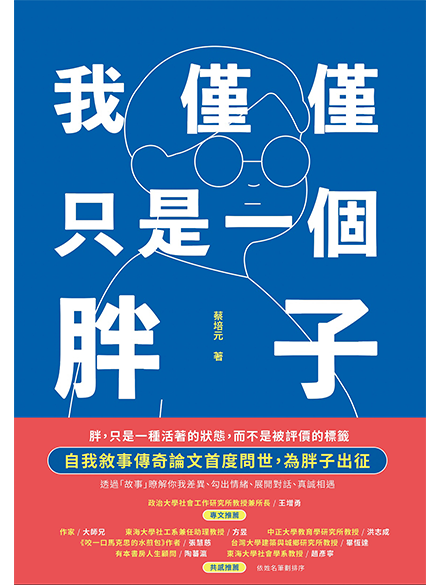Part personal narrative, part sociological critique, A Fat Man / A Better Man chronicles one man’s journey towards self-acceptance in a world where excess body weight is considered a personal failing.
Growing up in Taiwan, a society where thinness is akin to virtue, Tsai Pei-Yuan always felt he was treated differently. Throughout school and his professional life, his pudgy body was something he could neither escape from, nor bring himself to fully face. It wasn’t until graduate school that he made the courageous decision to begin writing about his life, hoping to come to terms with the difficulties and frustrations he had endured while growing up fat.
In A Fat Man / A Better Man, Tsai Pei-Yuan embarks on an introspective journey in two parts. He begins by chronicling the negative life experiences he encountered due to his body type: the peers who said he would never find a girlfriend unless he lost weight, the P.E. teacher who told him fat people can’t be winners, and the coworkers who always assumed he couldn’t carry out basic physical tasks.
The latter half of the book is a sociological exploration of the stereotypes applied to people with excess body fat. Far too often, society assumes that larger people lack self-control, suffer from poor health, or have underlying emotional issues. Through examples drawn from his own life experiences, Tsai Pei-Yuan illustrates how these negative images are imposed onto overweight individuals. When the author was excused from obligatory military service due to his weight, it reinforced the image of fatness as something akin to a handicap. Airlines mandating the purchase of multiple seats and weight limits on amusement park rides all conspire to limit freedom of movement, making the overweight feel like second-class citizens. As the author dissects the labels imposed on heavier people, he gradually dismantles his own assumptions and beliefs about his body, health, and relationship to food. Through the process of writing, he begins to see his difficulties in a new light, ultimately learning to live with greater ease and self-acceptance.
Deftly alternating between personal anecdotes and sociological analysis, Tsai Pei-Yuan’s writing brims with insight, humor, and authenticity. A deceptively light read that is never short on depth, A Fat Man / A Better Man will inspire readers to consider new perspectives, and challenge their existing beliefs about bodyweight and physical appearance.
